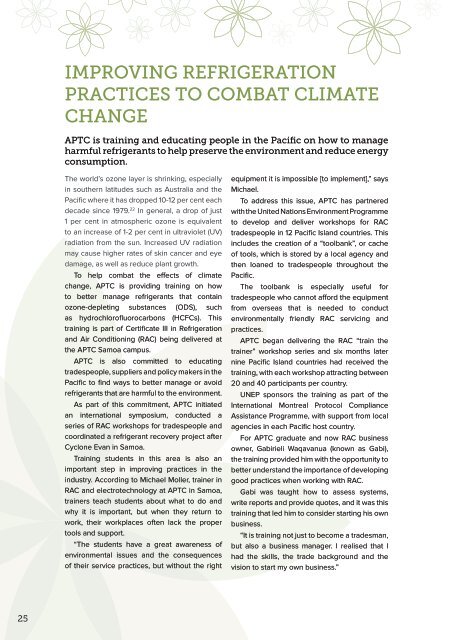ONE STORY - MANY LIVES
You also want an ePaper? Increase the reach of your titles
YUMPU automatically turns print PDFs into web optimized ePapers that Google loves.
IMPROVING REFRIGERATION<br />
PRACTICES TO COMBAT CLIMATE<br />
CHANGE<br />
APTC is training and educating people in the Pacific on how to manage<br />
harmful refrigerants to help preserve the environment and reduce energy<br />
consumption.<br />
The world’s ozone layer is shrinking, especially<br />
in southern latitudes such as Australia and the<br />
Pacific where it has dropped 10-12 per cent each<br />
decade since 1979. 22 In general, a drop of just<br />
1 per cent in atmospheric ozone is equivalent<br />
to an increase of 1-2 per cent in ultraviolet (UV)<br />
radiation from the sun. Increased UV radiation<br />
may cause higher rates of skin cancer and eye<br />
damage, as well as reduce plant growth.<br />
To help combat the effects of climate<br />
change, APTC is providing training on how<br />
to better manage refrigerants that contain<br />
ozone-depleting substances (ODS), such<br />
as hydrochlorofluorocarbons (HCFCs). This<br />
training is part of Certificate III in Refrigeration<br />
and Air Conditioning (RAC) being delivered at<br />
the APTC Samoa campus.<br />
APTC is also committed to educating<br />
tradespeople, suppliers and policy makers in the<br />
Pacific to find ways to better manage or avoid<br />
refrigerants that are harmful to the environment.<br />
As part of this commitment, APTC initiated<br />
an international symposium, conducted a<br />
series of RAC workshops for tradespeople and<br />
coordinated a refrigerant recovery project after<br />
Cyclone Evan in Samoa.<br />
Training students in this area is also an<br />
important step in improving practices in the<br />
industry. According to Michael Moller, trainer in<br />
RAC and electrotechnology at APTC in Samoa,<br />
trainers teach students about what to do and<br />
why it is important, but when they return to<br />
work, their workplaces often lack the proper<br />
tools and support.<br />
“The students have a great awareness of<br />
environmental issues and the consequences<br />
of their service practices, but without the right<br />
equipment it is impossible [to implement],” says<br />
Michael.<br />
To address this issue, APTC has partnered<br />
with the United Nations Environment Programme<br />
to develop and deliver workshops for RAC<br />
tradespeople in 12 Pacific Island countries. This<br />
includes the creation of a “toolbank”, or cache<br />
of tools, which is stored by a local agency and<br />
then loaned to tradespeople throughout the<br />
Pacific.<br />
The toolbank is especially useful for<br />
tradespeople who cannot afford the equipment<br />
from overseas that is needed to conduct<br />
environmentally friendly RAC servicing and<br />
practices.<br />
APTC began delivering the RAC “train the<br />
trainer” workshop series and six months later<br />
nine Pacific Island countries had received the<br />
training, with each workshop attracting between<br />
20 and 40 participants per country.<br />
UNEP sponsors the training as part of the<br />
International Montreal Protocol Compliance<br />
Assistance Programme, with support from local<br />
agencies in each Pacific host country.<br />
For APTC graduate and now RAC business<br />
owner, Gabirieli Waqavanua (known as Gabi),<br />
the training provided him with the opportunity to<br />
better understand the importance of developing<br />
good practices when working with RAC.<br />
Gabi was taught how to assess systems,<br />
write reports and provide quotes, and it was this<br />
training that led him to consider starting his own<br />
business.<br />
“It is training not just to become a tradesman,<br />
but also a business manager. I realised that I<br />
had the skills, the trade background and the<br />
vision to start my own business.”<br />
25



